Rooted In Revenue
Before the Event
Episodes
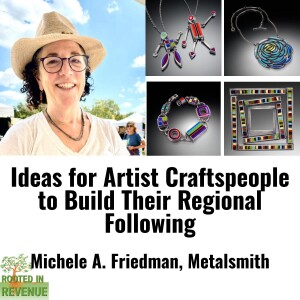
Wednesday Oct 09, 2024
Artisan Engagement: Mastering Regional Show Interactions
Wednesday Oct 09, 2024
Wednesday Oct 09, 2024
In this episode, Susan Finch sits down with Michele A. Friedman, a talented metalsmith and jewelry designer with over 26 years of experience in the art world. From her early days studying fashion design at Parsons to becoming a full-time artist, Michele shares her journey and insights on navigating the business side of art. Discover the importance of human connection in selling art, learn strategies for engaging customers at shows, and explore the delicate balance between creativity and commerce. Whether you're an aspiring artist or a seasoned professional, this episode offers valuable lessons on turning your passion into a sustainable career.
Links from this episode:
https://www.facebook.com/MicheleAFriedmanJewelry
https://instagram.com/mafdesign1
https://www.instagram.com/colerodgerimage/ - Michele's photographer
https://pjlabarge.com - wildlife sculptor
https://joyridejewelry.com How we met
Michele's bio - in her words:
My jewelry results from my desire to incorporate color, pattern, and texture into my work without setting stones. The color was to be from an alternative source. Through trial and error and consideration of many materials, I concluded that wool felt perfect. The material is durable, pliable, and possesses a rich, saturated color and a hint of texture. I manipulate the felt into shapes and set them like stones into my oxidized sterling and 18k Bi-metal jewelry. This is a technique that I developed on my own to suit my needs.
I have always had a Metal line of jewelry, which has evolved over time. In June 2020, I finally added my Metal line online for purchase and have added a number of pieces since. It is comprised of oxidized sterling silver, 18k Bi-metal, and now some 14k vermeil pieces, too. The Metal line can easily be worn with the FELT line as many common design elements and components exist.
I am inspired by graphic, product, furniture design, and architecture. Frank Lloyd Wright, Charles Rennie Mackintosh, and Vasily Kandinsky are among my many influences. I love Modern Art and Design.
I am a native Chicagoan. I attended Parsons School of Design in New York City. I currently reside in Chicago with my husband John and our two cats, Rosie and Zero. When I am not on the road, I love to travel abroad with my husband, visiting art museums, absorbing cultures, and eating great food!
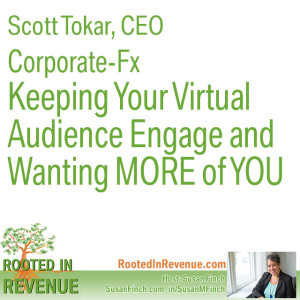
Wednesday Aug 05, 2020
Keeping Your Event Attendees Engaged and Wanting More
Wednesday Aug 05, 2020
Wednesday Aug 05, 2020
Ever the optimist, Award-winning Magician, Scott Tokar, is looking forward to the irreplaceable trade shows he is a part of regularly. His corral of other performers know they can adjust and do online appearances, but nothing replaces the barker at a trade show driving people you never reached before to hear your message through entertainment. This episode of Rooted in Revenue first appeared on SLMA Radio. Susan Finch interviews Scott to talk about adjusting, the value of performers to help carry the "hosting" load at virtual and in-person events, as well as how you can plan for when in-person events return or how to stand out with your hybrid or virtual event.
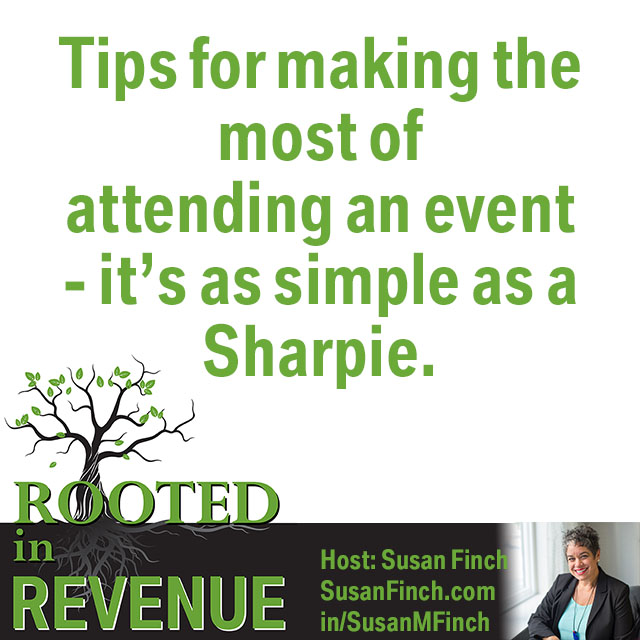
Wednesday Jun 06, 2018
6 Easy Event Attendee Tips to Maximize the Value
Wednesday Jun 06, 2018
Wednesday Jun 06, 2018
If you attend any type of networking event, seminars, workshops, tradeshows; listen to find out how you are wasting your time. There are six tips in this short episode on ways you can maximize the value from the events you attend, especially those you pay for. There is even a tip for those of you hosting events with sponsors - how to keep them coming back for more! Have more tips? Let me know. I'd love to hear how you generate revenue from attending events. I'm sure Lany would be interested, too.
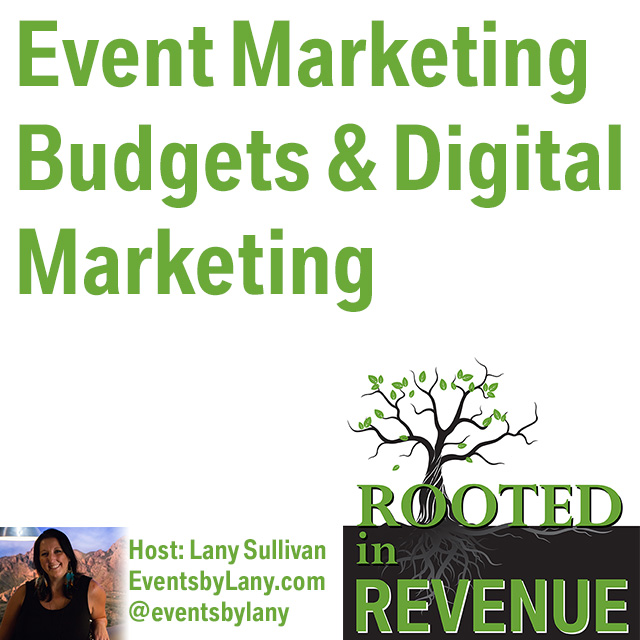
Monday May 21, 2018
Event Marketing Budgets & Digital Marketing
Monday May 21, 2018
Monday May 21, 2018
Every year businesses determine what their marketing, sales, sponsorship, advertising, social,etc, etc line items will be in the budget.
If you are an entrepreneur and not doing this I would highly recommend you find a money manager and start doing this.
What many businesses forget to think about (or it's an afterthought) is events.
Events are magic.
Alright, maybe that's not the best selling point for me to give to justify adding events into your annual budget. Let's look at every major consumer brand in the US. Every single one of them does events. They spend hundreds of thousands and millions of dollars to get eyeballs on their brand and samples of products in consumer hands.
The #1 reason to do events is visibility and brand awareness.
These brands look for an ROI, but do you know that it's not always a cash/revenue ROI that they want to see?
They want to see impressions. How many people saw our product and within that there are calculations to figure out the reach of what one individual consumer is actually worth in impressions. It's a complicated math game.
So, if these brands think it's important why don't you?
You don't have to spend hundreds of thousands or millions of dollars. Let's start small.
You are an entrepreneur and have a service that you offer (coaching, tech, social media, etc). You can invite 5-20 people to an event and charge then $0-300.
This event can be held in your living room, an art gallery, a golf club or resort, a gorgeous meeting space in a local hotel. Heck, even the library. These spaces will cost you anywhere from $0-$1500.
Your invite your guests to come to a local half day or one day event to learn from you on a specific area of your service.
You show up and deliver an abundance of value and they walk away feeling like they just won the lottery. What really happened here?
You just made an impression. Hundreds of them.
If you delivered tons of value...
They are going to see you in a different light. They will see you as the expert.
They will tell their friends and business associates about you.
They will share your info on social media.
They may hire you for your expertise.
An event like this doesn't require
A lot of planning
An event planner
A large budget
Let's simplify this even more.
Invite 5 of your closest business associates to a 2 hour session for free or for a very low price to give you feedback on a presentation that you have been working on. Ask for feedback and referrals. Let them know up front that you'll be asking for feedback and referrals, so that they come prepared.
Do this. Experiment. Get out of your comfort zone.
The do it again with a larger crowd. Invite your 5 friends back and ask them to bring one person with them the next time.
Each time you do this you begin to get more comfortable and confident in your content and the service that you offer. Talking about what you do will feel less and less salesy.
Create monthly or bi-monthly events. All low cost. All local. Create a routine and become familiar to your local community. Once the word gets out that your are offering high value information in your events you will attract your target audience and before you know it, you will need to create a bigger event at a larger venue.
If you start out small like this you can create a line item for events of $10,000 or less and create something impactful in your first year.
If you want to create larger events, I recommend that you start planning and budgeting 12-18 months out. If you know your event is going to cost $30,000 then every month you start tucking away and saving money that is specifically earmarked for your event.
This process makes it easier to pay deposits when they are due. Rather than stressing about how to come up with the money, you know you already have it in your event budget and can comfortably right that check or put down that credit card for the deposits.
What I see happen all the time is business owners decide they want to create an event, then they realize the cost and they either scramble to find the money causing way more stress than needed or they toss their dreams aside and forget it OR they try to create a Ritz Carlton event on a Motel 6 budge….. ON THEIR OWN….and fail miserably, swearing off events for the unforeseeable future BECAUSE events don't work!
Events work, but just like everything else in your business you need to have a budget and a strategy.
If you run a marketing agency, especially a digital marketing agency and don’t have an event arm in your business strategy you are doing your clients a disservice.
Hold up, don’t be mad. I’m trying to help you out here. There is so much focus on the digital side and you are working SO diligently for your clients. It’s an uphill climb to get visibility, to get their product or service out, to get engaging customers. I know your struggle. We live in a very loud world where everyone is trying to get everyone else’s attention.
How do you stand out in the chaos?
This well known but underutilized tool called events.
If you showed up with an event strategy for your clients that pulled their customers into a face to face, hands on experience you’ve just changed the game. You’ve now opened up another marketing channel that probably was not in use… WOMM. Word of Mouth Marketing. WOMM is a powerful marketing tool. It is not dead. It is alive and well. Look at every movie you’ve watched and who have you told about it? What about that bad customer service or the great sales on shoes? You’ve called your friends, told your co-workers, cousins, bosses, nanny, neighbor, everyone and shared an experience that you had with a brand, company, movie, etc.
This is why events are so dynamic and this is why it’s your responsibility to show your clients that value of creating live events.
If we go back to my post about having an event budget, you will see that I talk about what the major consumer brands are doing. They are actively every year putting their products in the hands of their consumers.
I hear you saying, well I don’t have a product that I can give away. I disagree. You can pull anyone in to play and test your product in your offices. Create a fun tech day and invite potential customers to come in, eat some food, learn about your services and get their hands on your product live and in person. SIMPLE.
You don’t have to pass out millions of samples, you can invite 5 to 10 local businesses in for a day or a couple of hours.
CREATE SOMETHING.
Be innovative. Your clients will appreciate that. They want that. They need that. They are hiring you to help them stand out from the noise. If you are just doing to some old offerings and programs you give to EVERY.OTHER.CLIENT. then you, my friend, are missing an amazing opportunity.
Expand your services, hire an event consultant (ahem...I’m available) and create some interesting and innovative ideas for your clients. Now YOU are standing out from the noise and are helping them do the same.
Let me say, that I see the lack of event ideas in the small, entrepreneurial marketing agency space. The big digital agencies have this down to a science. I recommend taking a page from their book and increase the offerings and calibur of your business. Watch it change your world.
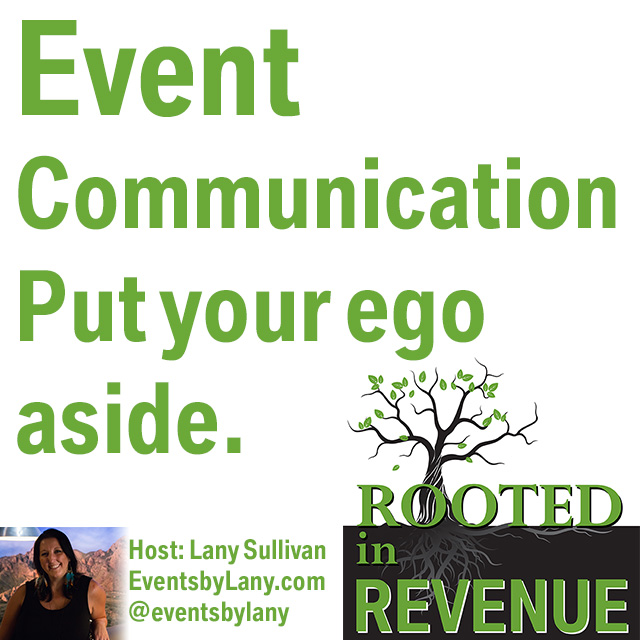
Thursday Apr 26, 2018
Event Communication - Put your ego aside
Thursday Apr 26, 2018
Thursday Apr 26, 2018
Communication can sometimes be the hardest part of an event. The details are manageable, but sometimes the people involved are not. You will deal with a wealth of personalities, opinions and experiences that you may not enjoy engaging with. Put your ego aside and listen first. Digest what is being said to you and then make sure that you clearly and concisely craft a response that does not incite drama.
Communication can be a challenge no matter what you are doing in life or business, but let's focus on the event application of it.
Why is communication important for an event creator, planner, founder or host?
It leaves no room for questions
It eliminate worry and concerns
It creates an open dialogue
It creates clarity
Communication these days comes in many forms; email, calls, text messages, Facebook messages, Google Hangouts, Skype, Twitter Direct Messages and even public posts on social. It's a wonder we can even keep our communication clear these days. As an event planner, I work hard to keep my communication with my clients down to just a couple of vices when it comes to communicating about an event. Typically, email is the first form of communication, then calls, text messages and somehow Facebook messages get thrown into the mix (even though I still hate Facebook). The more complex an event, the simpler your form of communication should be. There are so many elements to manage and execute on during an event, you want to make sure that your communication is clear for all parties involved.
Clear communication really helps to eliminate the stress, burden and annoyance of someone saying "I didn't know". Trust me on that one. Usually I am running more than one event at a time, so I am dealing with different personalities, opinions, expectations, etc, etc and I have to be able to navigate them without getting myself into trouble. We're all human, but sometimes we forget and take our frustration out on the person delivering the message not thinking about the ramifications of our form of communication, tone or words.
Let's talk about events that I have run in the past. When confirming event details with speakers, I prefer a very clear and detailed form of email that lays out all their needs, deadlines, expectations, reservations, etc. Sometimes these emails can be long, but I make sure that they are extremely clear. I even have it proof read by someone not on my team (who would know all of the details) to make sure that it makes sense to them (as someone not in the know). I make adjustments on clarity where necessary and then shoot the email out to the speakers.
Would it shock you to know that more often than not 20-30% of the responses ask questions regarding items that I clearly laid out in my email?
Probably not. It doesn't surprise me either.
We move through our days too quickly. We skim emails. We scan for what we recognize and then we shoot from the hip. We're all guilty of it. I've done it myself. Now, what if we as event planners, event creators, speakers, vendors and all other active participants slowed down for a hot minute and read through the email before jumping all over the messenger? That would be quite a novel idea.
Let's flip the script a bit. I was invited to speak at an online conference. I spoke with the host about the details and said I was definitely interested. That was the last I heard about it until about 15 days before the conference when I reached back out again to the host. I was getting ready to finalize my content and I wanted to make sure that my presentation and delivery was what they were looking for. After about 45 minutes on the phone and 20 questions from me to the host, I felt I had a good understanding of what they wanted. A week later I received a message from the host asking me when I could record. I was confused because nowhere in our previous conversations had they mentioned me recording my presentation with them. At this point I was already pre-recording my content and informed them so. They agreed to let me move forward with the pre-recorded presentation. My team finished compiling the presentation and I delivered it via email to the host. Wouldn't you know, I received an email in response that informed me that I did not use the event branded template.
Hhhmmmm.......
Again, nowhere in our conversations did a branded template ever come up. Might I remind you as well, that up until that point I had still not received any details about the event, expectations, deliverables, timing, etc. NOTHING. I even had to ask for an affiliate link after the host complained that no speakers had been promoting the event. I informed the host that I would be happy to promote it, but I never received an affiliate link as verbally promised.
I promoted the heck out the event, but I never saw the host promote the event until 4-5 days prior to it going live. Now, the day before the event I received an email geared toward participants informing them about all the good stuff happening during the live conference. It said that the speakers would be showing up live during their sessions. Guess who never received an email from the host letting her know when her session was going to be live so that she could show up and serve the audience properly. You guessed it... This girl.
Needless to say, the communication on that event is a prime example of what not to do as a host/event creator. Please take care of your speakers and communicate with them actively and often. They want to show up and do their best for you and your tribe.
I was recently chatting with another event planner and we were swapping stories as we all do about specific scenarios that we run into with clients. She shared with me that she resigned from a client because one of the major issues was communication. The client doesn’t like to repeat herself and gets upset when she has too. Understandable. Here’s the glitch. The client doesn’t give clear instructions in the first place. She’s all over the board and so when her team returns to her to get said clarification she loses it.
Events are hard enough as it is, so the client who doesn’t communicate wants, needs and desires clearly throws a monkey wrench into the whole thing.
Here’s the thing, to create something amazing and to keep the entire team, vendors and venue on task and on the same page this communication thing has to be worked out.
If someone from your team comes to you and doesn’t understand your instructions or the vendor is not clear or g-d forbid the venue is not clear; DO NOT BITE THEIR HEAD OFF. Pause. Breathe. Take responsibility. Ask them what they did not understand. Repeat what they said to you, so they know that you heard them (and didn’t lose your shit). State your instructions as clearly as you can and then ask if they understand or have any questions that you can clarify.
This is common sense, but we are not taking the time to communicate.
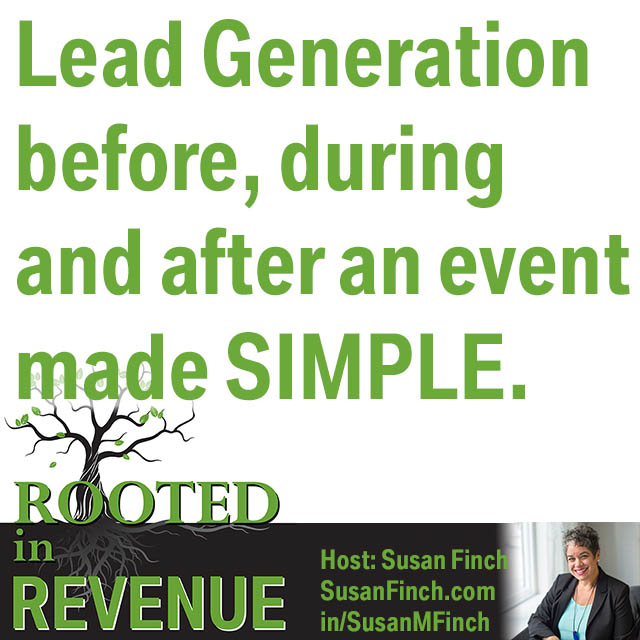
Monday Apr 23, 2018
5 Simple ideas to generate leads before the conference
Monday Apr 23, 2018
Monday Apr 23, 2018
You know you need to participate in industry conferences. You decide which capacity for each one whether your are simply an attendee, an exhibitor, a speaker or a host of a special event at the conference such as a cocktail party or gold event. When that decision is made, the clock of effectiveness is ticking. How will you add this to your already full schedule of tasks?
I’ve done this for several clients with great success. They were shocked at how much of a difference this effort made in their HOT leads and advocates. They never realized how much money they were leaving on the table and how their half or quarter effort was really just going through the motions at these conferences and trade shows.
We also realize it doesn’t end when you head back to the office. That’s the afterglow of the conference. We aren’t done yet. Before you get back into your routine, we’ll have continued engagement to maximize your new potential clients and advocates.
Do you have conferences coming up? Do you have enough staff to really make a grand entrance – I’m talking trumpets and rose petals. If not, you need our help. Let’s talk and see how this would look so you can plan. Try to give me more than a couple of weeks’ notice – really. Months are better!
Do you need help determining HOW much to host, promote and how to execute it? Short handed - that's where Lany Sullivan comes in. You need to schedule some consulting time with her to determine HOW to make the most of the event. Head on back to me to help create the materials to execute the plan.
Go under the "events" category or Hosted By Lany to listem to more of her expertise.
Monday Mar 26, 2018
Monday Mar 26, 2018
How do you know if your marketing dollars are leading to revenue unless you can track it? Even small businesses that have one or two events a year need to be tracking how their efforts pay off. Sometimes we pay for ads in directories, sponsor events, sponsor a local team of kids, put an ad in the church bulletin, boost our listings in the Chamber of Commerce or other business organization listing. Don’t you want to know if it worked? Don’t you want to know if people not only saw the ad but clicked on it? Sometimes these sites and situations have strict guidelines as to what the links can go to.
Sometimes you need to be able to SAY the link out loud from a stage, podium, on a podcast, over lunch - don’t make it difficult. If you know you’ll be SAYING your domain regularly or one to promote your event, make sure you get a domain that is easy to spell, remember and SAY.
How many of you have ever heard on a podcast, video or show, “How can listeners get in touch with you?” and the guest stumbles out a clumsy answer, “Go to our home page: www.mycomplexdomainspelledweirdly.com and then click in the left on the button that says, “special event”.
Here’s all that’s wrong with that:
www - your domain needs to resolve with and without www.
Your domain needs to automatically resolve to the SSL version of your site - you’ll need to buy an SSL certificate and set it up properly so that no matter what page people go to without https:// it will flip to https://
Your domain needs to be LOGICAL and EASY to say and spell. None of this Eleet E - l - e - e - t Realty type of stuff. If the real way to spell a word is gone, think of a new domain. We can’t all have .com.
Your call to action link cannot require you to then explain where they can FIND the information to click again. That final destination page needs to be the domain.
Let’s talk about resolving #4.
If you have a landing page in the middle of your website for this event or promotion, buy ANOTHER domain for THAT thing and have it redirect to THAT landing page. You will then be able to easily market and track that domain and page. If your event is Health Jamboree 2018 and you are in Portland, and your website is: HealthyChoicesWeMake.com - you want to consider these options:
Create a subdirectory link: healthychoiceswemake.com/jamboree18, or just jamboree to always use the same URL year after year, but update the content.
Create a SUBDOMAIN: jamboree18.healthychoiceswemake.com
OR an entirely clean URL: HealthJamboreePDX2018 .com that would redirect to either a landing page in your main site, or be a specific site JUST for this event with cross linking from your main site. So many options.
Your plan all depends on your vision for the event, Is it a one time, or the first of many recurring each year or in different regions. You’ll want to plan for this type of repetition or growth when you secure your unique domain so you can follow the pattern. Keep in mind regional uses of abbreviations. Up in Portland Oregon, PDX is a common way to shorten Portland and surrounding areas. It’s the airport call letters. That won’t work well in Los Angeles - LAX because that’s also an abbreviation for the sport, Lacrosse. A lacrosse jamboree is way different than the topics in our health jamboree, but the search results may confuse and irritate those that click if it’s not completely clear.
Is this for a BOOK? A book always needs its own website with a way to purchase EVERY format: print, ebook, kindle, itunes, etc. AND you need a form that will collect information and add them to a drip campaign regarding the book, the tour schedule, appearances, tips from the book and more. BUILD and sustain buzz.
Let’s briefly talk about squeeze pages. It’s a newish, more recent term that merely describes a VERY simple, uncluttered page to drive people to ONE specific call to action:
Register, subscribe, buy, answer a quiz, watch a video, etc. Some website themes have built in squeeze page templates. Many CRM services offer squeeze pages with unique URLs for sharing and tracking.
These same rules applies to hashtags for your initiatives, products and events. It’s OK to ride the hashtag others have used for related topics, but for your unique application and tracking purposes, be very careful and make sure it’s not already in use by a competitor, something unsavory altogether or something that is viewed with disdain by all or offends your target audience. Acronyms can be a messy place to tread.
A good tool is Keyhole: http://keyhole.co/ You can utilize their free trial to make sure your hashtag is safe to use.
Hashtracking (https://www.hashtracking.com/pricing/ ) is another service.
This list of 6 is somewhat misleading. They are not free, but usually have free trials: https://sproutsocial.com/insights/hashtag-analytics/
If you are going to use a hashtag regularly, or it is tied to a trademarked name you own, you might want to register it with Twubs: https://twubs.com/p/register-hashtag
ROOTED TIP: When you sign up for free trials, you usually have to give a credit card. Mark a LOUD reminder on your calendar for the day or two before so you END the trial and remove your card from their system if you don’t want to have it automatically charge your account.
Let’s talk about tracking.
You need to know WHO is going to your landing page, using your hashtag and from where. The easy way is to add this landing page URL, unique URL into your Google analytics. If your squeeze page is contained within your website, you’ll need to add the Google Analytics code into the page code to track it. This will also give you information as to their journey from your main site and what they did after.
Remember to add it to your Search Console, as well - be specific with the domain - https:// - if your landing page is within your main site using a subdomain or subdirectory domain/xxxx then the existing SSL you have will most likely cover it. Confirm if you are going the subdomain route: myevent.mydomain.com Some cheap SSL certs won’t cover that. Also, if you have a payment gateway associated with the event, book, etc. can you track THAT part of it?
If this is for a unique domain, you’ll need to add tracking code into the header for all pages associated with this. You can learn more about how to do that in this article as well as tracking hashtags in analytics using tag manager: http://www.trackify.co.nz/blog/tracking-anchor-tag-hashtag-pageviews-in-google-analytics
And:
https://webmasters.stackexchange.com/questions/113338/how-does-ga-show-an-url-with-a-hashtag
And here:
https://www.analyticsmania.com/post/single-page-web-app-with-google-tag-manager/
Get more tips on my site: https://susanfinch.com/rootedtips
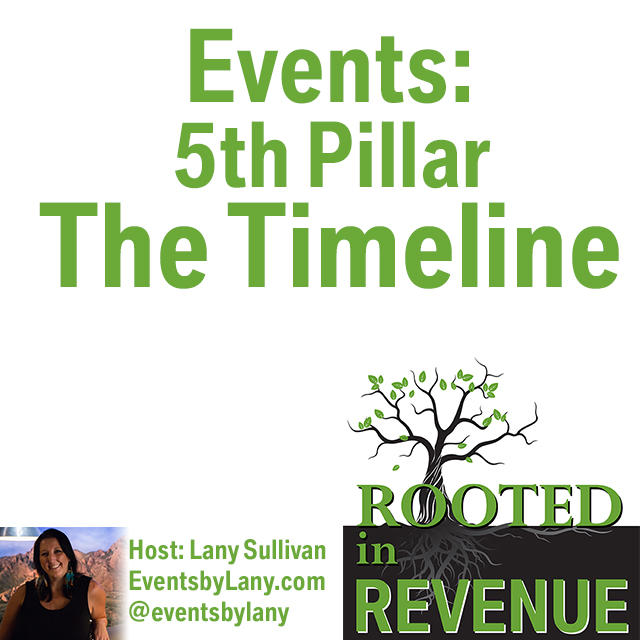
Monday Feb 19, 2018
Your event timeline - when does it start?
Monday Feb 19, 2018
Monday Feb 19, 2018
When planning an event, meeting, retreat, workshop or conference you will want to build out a timeline for your event. Certain elements of your event need to be reserved, contracted, ordered and paid for by a specific time frames prior to the event. If you have a member of your team managing this part of your event, you will want to ensure that they have the proper information and authority to complete tasks and sign contracts on your behalf.
Most large events are planned 12-18 months in advance, but here is a good guideline to follow depending on how often you are running your event.
Annual Events - Start 12-18 months out
Semi Annual Events - Start 9-12 months out
Quarterly Events - Start 6 months out
Monthly Events - 3 months out
If the event is an annual event, you will start planning your next event almost as soon as your current event is completed.
The shorter the lead time on an event, the tighter the deadlines and potentially the higher stress.
Lofty dreams and goals for events don’t work to create a successful event.
I had a client come to me wanting to create a 300 person event in 60 days from scratch.
The event idea was amazing, but they had no idea how they were going to put it all together, pay for it and get butts in seats in that time frame.
Doing a smaller event in a short time frame is definitely doable, but you need to be super realistic when it comes to deadlines, money and attendance goals.
The greater the lead time to plan an event, the higher the success rate.
Download your Quick Start Timeline at eventslany.com/rootedtips
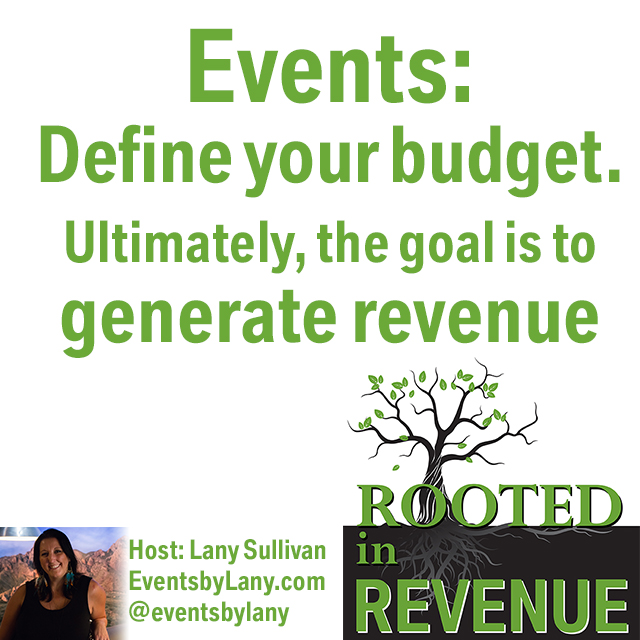
Monday Feb 05, 2018
Defining Your Event Budget
Monday Feb 05, 2018
Monday Feb 05, 2018
Are you making money or losing money? You MUST have a budget. You must forecast your expenses and plan out your profits to give you an idea of what your numbers may or may not look like. You can’t wish on a star and hope it will all be ok.
How much money do you have to spend for this event?
Are you receiving donations from vendors?
Will you be looking for sponsors?
Do you plan on having exhibitors?
Sponsorship is a GREAT way to cover the cost of your event and I know that topic is covered in this summit, so I hope you paid attention.
Do you plan on generating a profit from your event?
If so, make sure you calculate that into your numbers, so that you’re not fighting to save your profit at the end.
Do you have a contingency in place?
With everything you do in your event you will need to have a contingency or backup in place, just in case something (inevitably) goes wrong or costs more money than you had originally planned.
Always budget at least 15-20% contingency
Did I mention that things inevitably go wrong? If you don’t have room in your budget, then you could be costing yourself more than just money. Think stress, overwhelm, fear, anxiety...yes...you will create a huge burden of stress. So, let’s just eliminate that right from the beginning. Plan to have a contingency (or buffer) in your budget for the unexpected.
Let’s look at what you need to budget for….
Venue
Decor
Design
Event Tech
Group Activities
Entertainment
Furniture Rentals
Licensing
Insurance
Wifi
Electrical
A/V Equipment & Setup
Staging/Lighting Rental/Vendor
Food/Catering Services
Hotel Accommodations for:
Team
Guests
Speakers
Attendees
Stipend for:
Volunteers
Staff
Speakers
Ground Transportation for:
Team
Guests
Speakers
Attendees
Speaker Honorarium
Advertising/Marketing
Print Services
Staffing
Shipping
Storage
Taxes
Fees
Clean up
Union Fees
Deposits
Cancellation Fees
Get your Quick Start Budget Template or your Full Event Budget at eventsbylany.com/rootedtips
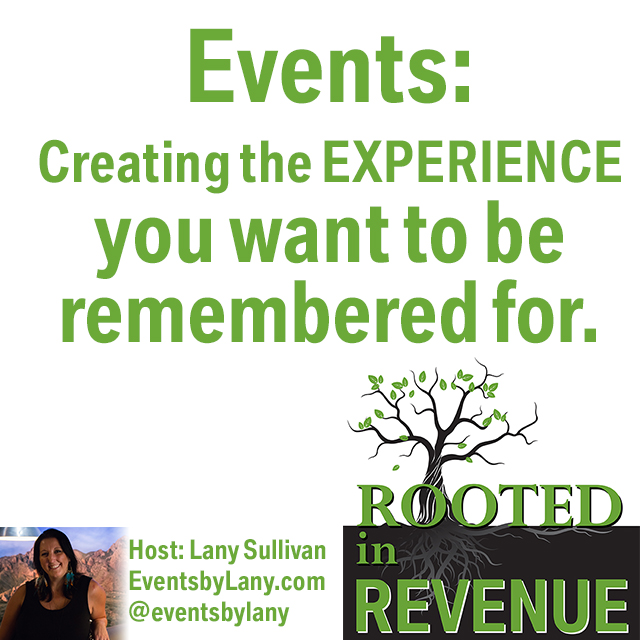
Monday Jan 22, 2018
Creating an amazing event experience.
Monday Jan 22, 2018
Monday Jan 22, 2018
We no longer just create events. We create experiences. Follow along with the questions below and develop your event using your past experiences and your personal preferences. Visualization is really powerful when creating your event experience.
Think about all of the events you have ever attended.
What memories or experiences stand out to you in this moment?
Are they good?
Are they bad?
Why did you like it?
Why did you dislike it?
Did that experience turn you off from attending that particular event in the future?
Would you go back to that event?
Let’s take it one step further. Think about the event that you want to create.
If you were attending your own event, what kind of experience do you want to have?
What does the event sales page add or take away from the experience?
How does your pre-event communication enhance the experience?
What are you feeling when you arrive in the host city or country?
What kind of feelings and emotions are you feeling as you arrive at your hotel for check in?
Was your hotel check in smooth and seamless?
Do you feel welcome?
Next, let’s walk through the event registration.
How do you feel?
Calm, cool, collected, nervous, excited, frustrated, angry, tired, ready to go home?
Now I want you to move yourself through the event.
What excites you?
What type of personality or energy are you and what do you need?
Do you need space to decompress or are you ready to party all day, every day?
Is the food amazing? Are you never leaving the buffet line? Or are you out looking for the nearest sushi restaurant?
Are you wow’d by the decor?
Does it impress you or are you completely blind to it?
How is the speaker line up?
Are you on the edge of your seat or are you trying to hide that yawn to not be rude?
Is the music too loud or not loud enough?
Are you enjoying the connections you are making?
Are there even opportunities to make connections?
What is keeping you at the event? Or are you ready to bail after the first day?
What’s the best thing you are feeling?
What makes you grumpy thinking about your event?
Ok, now that you’ve experienced your own event make note of the good that you experienced and the bad that you want to avoid.
Get Lany’s 7 Tips to Create an Amazing Experience at eventsbylany.com/rootedtips
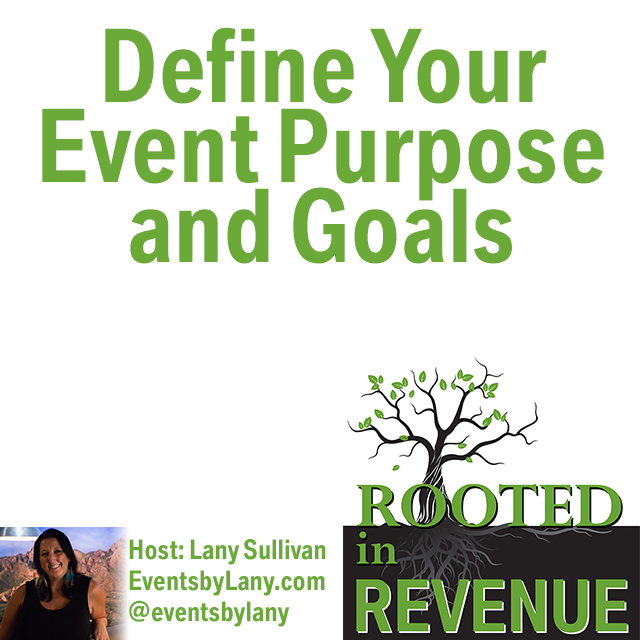
Tuesday Jan 09, 2018
Defining Your Event Purpose & Target Audience
Tuesday Jan 09, 2018
Tuesday Jan 09, 2018
In this episode Lany shares the first 2 foundational pillars to creating successful events. There are 5 foundational pillars and Lany will cover them all over the next few episodes.
In events there are 5 different areas that will help you build a solid foundation for your event.
Defining Your Purpose & Goals
Identifying Your Target Audience
Creating an Amazing Experience
Budget Planning & Management
Setting an Event Timeline
As you go through this episode and begin creating your event, ask yourself these questions that we cover.
Here are some questions to ask yourself.
Why are you holding this event?
What is the end result you want to achieve?
Are you doing an event to make money?
What is your ROI?
What is the perceived value? For you? For your attendees?
To grow your audience?
To increase brand awareness?
For a product launch?
To make money (yes, I repeated this on purpose)?
To create a unique experience for your followers?
To help your audience learn something new?
What do you want to accomplish?
Do you want to gain media coverage?
Do you want to increase visibility?
Do you want to contribute to your community?
Do you want to celebrate a milestone or success?
Do you want to build more connections/grow your tribe?
Do you have attendance goals? How many butts in seats do you want?
Once you have your purpose and goals defined, it’s time to develop and define your target audience. Check out Hubspot’s Buyer Persona Template or our SLMA friend, Matt Heinz’ Buyer Persona Template.
Download your free Purpose and Goals cheat sheet & access your Buyer Persona Templates at eventsbylany.com/rootedtips